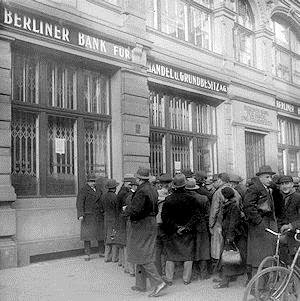Impact of the Great Depression on Germany
The Great Depression was a severe worldwide economic
depression in the decade preceding World War II. The timing of the Great Depression varied
across nations, but in most countries it started in 1930 and lasted until the
late 1930s or middle 1940s. It was sparked by the stock market crash of 1929 in the New
York Stock Exchange. The depression affected almost every country in the world,
but It ht Germany particularly badly, because Germany was dependent on loans
and investments from the USA. When the USA suddenly recalled the loans and
deposits from German banks, Germany suffered an economic crisis, which in turn
caused a social crisis. Factories closed down. Millions lost their jobs. The
government also had to make cuts to social services. Poverty, homelessness and
even starvation were commonplace. By 1932, six million people, or one-third of
the working population, were unemployed.
Companies throughout Germany - though
primarily in the industrial zones such as the Ruhr - went bankrupt and workers
were laid off in their millions. Unemployment affected nearly every German
family just 6 years after the last major economic disaster - hyperinflation - had hit Weimar.
September 1928
|
650,000 unemployed
|
September 1929
|
1,320,000 unemployed
|
September 1930
|
3,000,000 unemployed
|
September 1931
|
4,350,000 unemployed
|
September 1932
|
5,102,000 unemployed
|
January 1933
|
6,100,000 unemployed
|
After
the Wall
Street Crash, America gave Germany 90 days to start to re-pay money loaned to
her. No other world power had the money to give Germany cash injections.
Britain and France were still recovering from the First World War and the Wall
Street Crash was to have an impact on industrial Britain. Stalin’s Russia was still in a desperate state and embarking on the 5
year plans. Therefore, an impoverished Weimar Germany could only call on
America for help and she was effectively bankrupt by the
end of 1929 and quite incapable of lending money.
by the
end of 1929 and quite incapable of lending money.
Pictures of events that had happened during the great depression:
Adolf Hitler knew his opportunity had arrived.
 |
Breadline in New York City’s
Bryant Park
during the Great Depression.
|
In the good times before the Great Depression the Nazi Party experienced slow growth, barely reaching 100,000 members in a country of over sixty million. But the Party, despite its tiny size, was a tightly controlled, highly disciplined organization of fanatics poised to spring into action.
Since the failed Beer Hall Putsch in 1923, Hitler had changed tactics and was for the most part playing by the rules of democracy. Hitler had gambled in 1923, attempting to overthrow the young German democracy by force, and lost. Now he was determined to overthrow it legally by getting elected while at the same time building a Nazi shadow government that would one day replace the democracy.
 |
Shack, built of loose boards
and parts of boxes in New York
City
during the Great Depression
|
Hitler had begun his career in politics as a street brawling revolutionary appealing to disgruntled World War I veterans predisposed to violence. By 1930 he was quite different, or so it seemed. Hitler counted among his supporters a number of German industrialists, and upper middle class socialites, a far cry from the semi-literate toughs he started out with.
He intentionally broadened his appeal because it was necessary. Now he needed to broaden his appeal to the great mass of voting Germans. His chief assets were his speech making ability and a keen sense of what the people wanted to hear.
By mid-1930, amid the economic pressures of the Great Depression, the German democratic government was beginning to unravel.
Gustav Stresemann, the outstanding German Foreign Minister, had died in October 1929, just before the Wall Street crash. He had spent years working to restore the German economy and stabilize the republic and died, having exhausted himself in the process.
 |
| A run on a bank in Berlin |
The crisis of the Great Depression brought disunity to the
political parties in the Reichstag. Instead of forging an alliance to enact
desperately need legislation, they broke up into squabbling, uncompromising
groups. In March of 1930, Heinrich Bruening, a member of the Catholic Center
Party, became Chancellor.
Despite the overwhelming need for a financial
program to help the German people, Chancellor Bruening encountered
stubborn opposition to his plans. To break the bitter stalemate, he went to
President Hindenburg and asked the Old Gentleman to invoke Article 48 of the
German constitution which gave emergency powers to the president to rule by decree.
This provoked a huge outcry from the opposition, demanding withdrawal of the
decree.
to help the German people, Chancellor Bruening encountered
stubborn opposition to his plans. To break the bitter stalemate, he went to
President Hindenburg and asked the Old Gentleman to invoke Article 48 of the
German constitution which gave emergency powers to the president to rule by decree.
This provoked a huge outcry from the opposition, demanding withdrawal of the
decree.
 |
| Admiration for Soviet Russia |
As a measure of last resort, Bruening asked Hindenburg in July 1930 to dissolve the Reichstag according to parliamentary rules and call for new elections. The elections were set for September 14th. Hitler and the Nazis sprang into action. Their time for campaigning had arrived. The German people were tired of the political haggling in Berlin. They were tired of misery, tired of suffering, tired of weakness. These were desperate times and they were willing to listen to anyone, even Adolf Hitler.
No comments:
Post a Comment